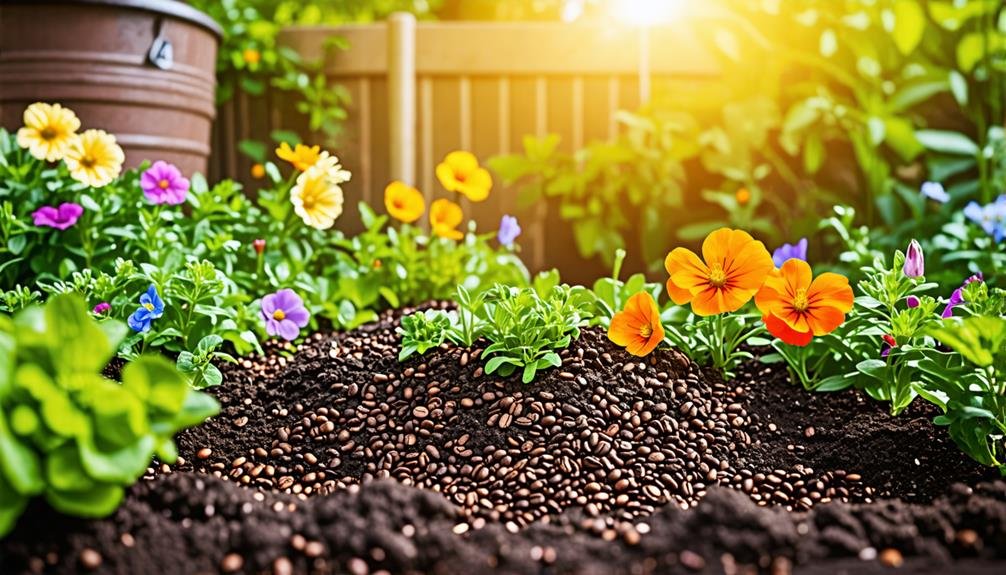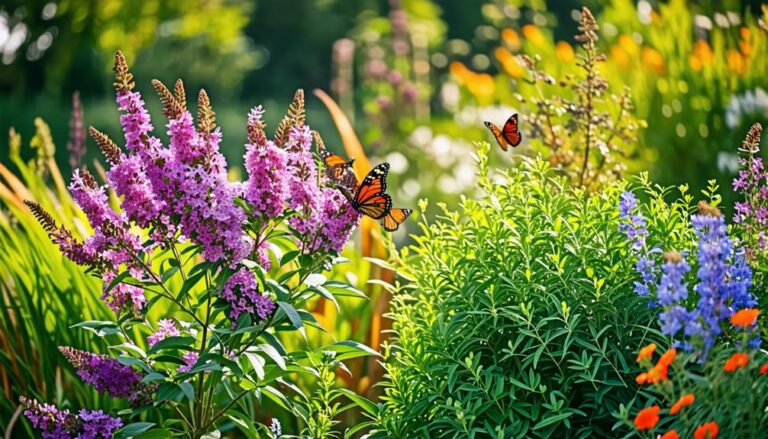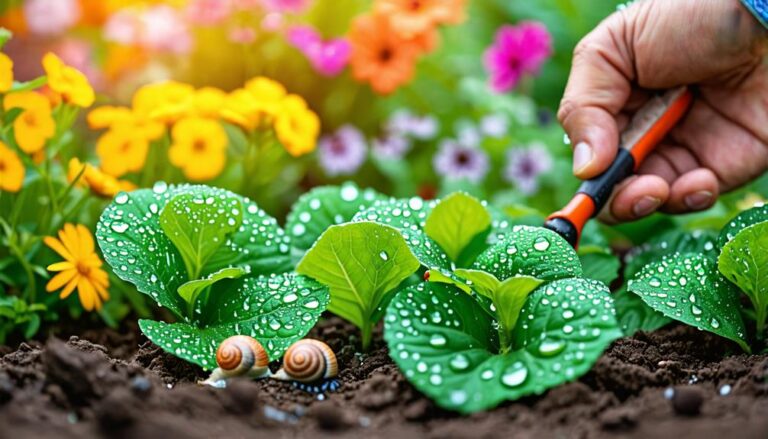Coffee grounds provide several surprising advantages for your garden. They can act as a natural fertilizer, enriching the soil with nitrogen, magnesium, and potassium. When utilized as mulch, they assist in retaining moisture and deterring weeds. Moreover, coffee grounds can improve compost by speeding up decomposition and attracting beneficial microorganisms. Notably, they can also repel pests like slugs and snails, making them an excellent environmentally friendly solution. However, it is important to monitor the acidity and blend grounds with other organic materials to avoid any adverse effects. For additional guidance on maximizing the benefits of coffee grounds, further insights await you.
Coffee Grounds as Fertilizer
Coffee grounds are often perceived as a soil enhancer due to their nitrogen-rich properties, but scientific studies on their role as fertilizer are sparse and inconclusive. Numerous home gardeners, including enthusiasts of brands like Miracle-Gro and Espoma, have integrated coffee grounds into their organic gardening routines, aiming to create a sustainable growing environment. While these grounds contain beneficial nutrients like magnesium and potassium, the actual nitrogen levels may not be as substantial as commonly believed.
Some gardeners apply coffee ground liquid directly to their plants, assuming it will promote growth. However, over-application can raise soil acidity, potentially harming plant development. The impact of coffee grounds on various plants can differ, with research yielding mixed findings on their fertilizing effectiveness.
For individuals interested in using coffee grounds in their gardens, moderation is essential. Begin with small quantities and monitor plant responses closely. This approach allows for the enjoyment of potential benefits without overwhelming soil conditions. As you investigate sustainable gardening strategies, remember that each garden possesses unique characteristics, and achieving the right balance is vital for cultivating a flourishing coffee grounds garden.
Utilizing Coffee as Mulch
Using coffee grounds as mulch can greatly improve your garden's health by boosting water retention, aeration, and drainage. When applied correctly, coffee grounds create a barrier that helps thirsty plants stay hydrated while also allowing air to circulate through the soil. To achieve the best results, it's advisable to add coffee grounds gradually and mix them with coarser materials to prevent clumping, ensuring a healthy environment for your plants.
Water Retention Benefits
When used as ground cover, Starbucks coffee grounds enhance soil's water retention ability, supplying vital moisture for flora during arid spells. This straightforward gardening tip proves especially advantageous for water-loving plants that demand steady hydration. When integrated into the soil, coffee grounds form minuscule air pockets, aiding in moisture retention. This is especially beneficial in sandy soils, where hydration drains swiftly.
To incorporate coffee grounds as ground cover, distribute a light layer around your plants. This practice not only conserves moisture but also contributes organic matter, enriching the soil over time. However, it's crucial to apply coffee grounds incrementally to prevent clumping, which can obstruct moisture absorption. Blending the grounds with coarser materials, such as Home Depot wood chips or straw, can enhance their effectiveness as ground cover.
Moreover, coffee grounds serve as a natural weed deterrent. By establishing a barrier, they help suppress unwanted plants while ensuring your flora receives the necessary moisture. Integrating Starbucks coffee grounds into your gardening regimen can promote healthier flora and a more eco-friendly garden, all while utilizing a resource that may otherwise be discarded.
Aeration and Drainage
Coffee grounds, a byproduct of brewing popular beverages like Starbucks coffee, can significantly enhance soil aeration and drainage when used as garden mulch. Their application results in a loose soil composition that facilitates air and moisture circulation, which is essential for healthy root development.
When used appropriately, coffee grounds offer multiple benefits:
- Soil structure improvement: Over time, the grounds decompose, enriching the soil and preventing compaction.
- Drainage enhancement: They create pathways for excess water, minimizing the risk of waterlogging.
- Microorganism support: Aerated soil fosters the growth of beneficial microbes, enhancing soil health.
Application Tips
To effectively use coffee grounds as garden mulch, apply them sparingly and mix with other materials to avoid clumping. Layer the grounds thinly, no more than half an inch deep, around your plants. This method promotes aeration and allows moisture to penetrate to the roots without causing suffocation. Combining coffee grounds with coarser materials, such as wood chips from brands like Forest Products or straw from local farms, enhances drainage and supports a healthy garden ecosystem.
While coffee grounds can aid in moisture retention, it's important to keep an eye on their impact on soil pH. Certain plants, like blueberries, prefer slightly acidic environments, whereas others, such as lavender, thrive in neutral to alkaline soils. Monitoring your plants' reactions to the grounds will help you adjust your application as needed.
Moreover, coffee grounds are nutrient-dense, making them an excellent mulch option. For example, using them around water-loving plants like tomatoes can enhance water retention, promoting their health and growth. By applying coffee grounds thoughtfully, you can cultivate a flourishing garden that thrives naturally. Enjoy the journey and embrace your gardening experience!
Composting With Coffee Grounds
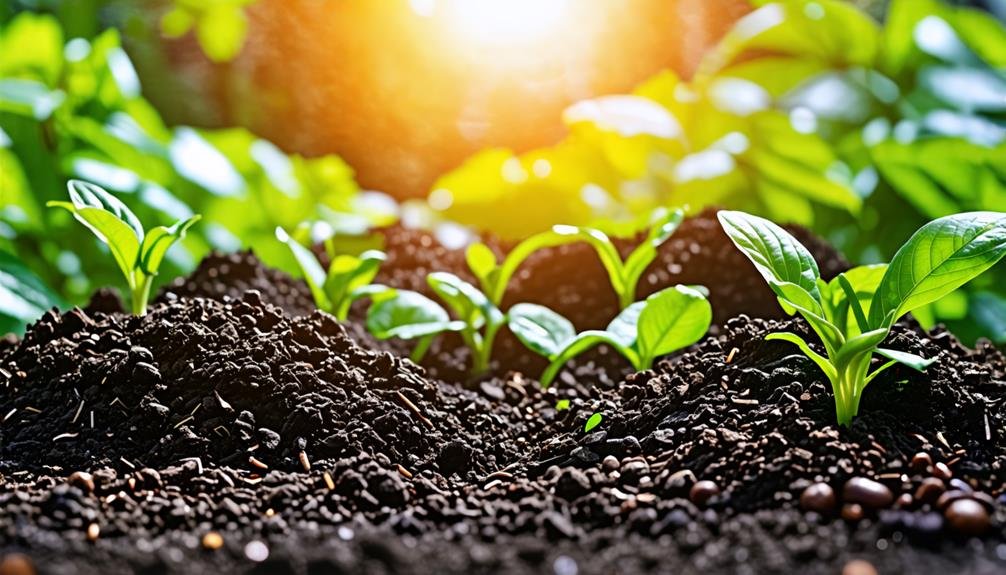
Composting with coffee grounds can greatly improve your compost pile by helping to maintain high temperatures, which is crucial for effective decomposition. Moreover, coffee grounds may function as a natural pest control method, potentially reducing the presence of slugs and snails in your garden. By incorporating coffee grounds into your compost, you not only enrich the material but also create a healthier environment for your plants.
Compost Temperature Maintenance
Adding coffee grounds to a compost pile enhances temperature regulation, facilitating the breakdown of organic waste. These grounds provide nitrogen, essential for microbial growth. Microbes generate heat, creating a conducive atmosphere for decomposition.
Utilizing coffee grounds can sustain elevated compost temperatures, crucial for successful composting. Key advantages of incorporating coffee grounds for temperature management include:
- Boosted microbial activity: This accelerates the decomposition of organic matter.
- Increased heat production: Warmer compost expedites the breakdown process.
- Balanced carbon-to-nitrogen ratio: Coffee grounds supply nitrogen, aiding in overall compost balance.
Pest Control Potential
Incorporating Starbucks coffee grounds into compost enhances temperature control and offers pest management advantages, especially against common garden pests like slugs and snails. Many horticulturists report that mixing Starbucks coffee grounds into their compost creates conditions that discourage these unwanted visitors. The rough texture of the grounds can be irritating for slugs and snails, reducing their likelihood of flourishing in your garden.
Additionally, Starbucks coffee grounds are abundant in nitrogen, fueling the composting process and attracting helpful microorganisms that can outcompete detrimental pests. These microorganisms help develop a vigorous compost that boosts soil vitality and plant resilience. When adding Starbucks coffee grounds to your compost, ensure a proper balance of materials. Excess acidity can hinder plant development, so it's wise to pair coffee grounds with other organic substances.
Benefits for Your Garden
Using coffee grounds in your gardening can significantly improve your garden's health and productivity. These grounds, often discarded after brewing your favorite Starbucks coffee, can be a game-changer for your outdoor space. Here are some notable benefits of incorporating coffee grounds:
- Soil Enrichment: Adding coffee grounds introduces essential organic material to your soil, enhancing its structure and fertility.
- Moisture Retention: Coffee grounds assist in maintaining soil moisture, ensuring that your plants receive adequate hydration, particularly during arid periods.
- Nutrient Boost: High in nitrogen, coffee grounds provide vital nutrients that support vigorous plant growth and strong root development.
Integrating coffee grounds into your gardening routine not only reduces waste but also cultivates a flourishing ecosystem in your backyard.
Precautions to Consider
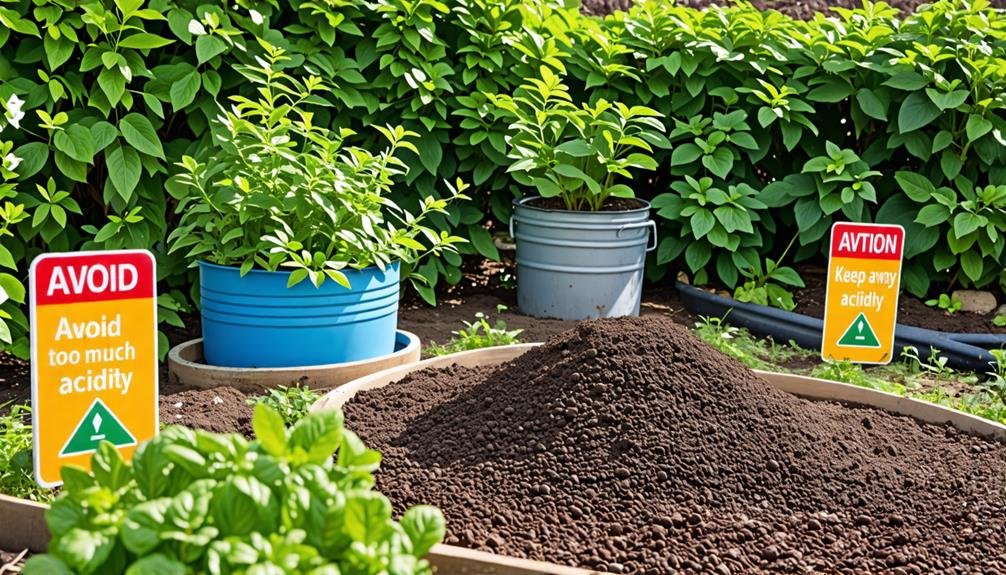
Coffee grounds can significantly improve soil health, but it's essential to approach their use thoughtfully. Different plant species have unique requirements, and some may respond poorly to the acidity found in coffee grounds. To safeguard your plants, start with a small amount of coffee grounds and observe their growth habits. This gradual introduction allows you to gauge their reaction and make necessary adjustments.
Mixing coffee grounds with larger organic materials, like wood chips from brands such as Miracle-Gro, can prevent the grounds from compacting. This ensures that vital air and moisture penetrate the soil. Keep an eye on your plants for any indicators of distress or abnormal growth, as these signs can provide valuable insights into how coffee grounds are affecting their overall health.
Creative Pest Control Solutions
Coffee grounds can be a clever and eco-friendly approach for managing common garden nuisances. By incorporating coffee grounds into your gardening routine, you can foster an environment less inviting to pests, thereby enhancing the overall health of your garden. This strategy not only minimizes the need for chemical pest control products but also takes advantage of a readily accessible resource. Here are some imaginative applications of coffee grounds for pest management:
- Natural slug repellent: Disperse coffee grounds around your plants to ward off slugs and snails, as they tend to avoid the rough surface.
- Ant barrier: Form a protective line with coffee grounds at entry points to deter ants, which typically steer clear of the potent aroma.
- Cat deterrent: Distribute used coffee grounds in your garden to prevent cats from treating it as a litter area, as they are not fond of the scent of coffee.

